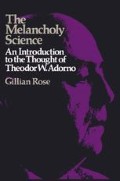Abstract
Adorno explored change in the mode of production domination in the sphere of culture, especially music and literature, not in the sphere of work. ‘Culture’ does not merely designate the realm of consumption, nor the organisation of leisure according to the principle of commodity exchange. Adorno developed a general theory of culture predicated on his use of Marx’s theory of value by transcribing the range of Marx’s categories of production (composition), distribution (reproduction), exchange (the culture industry) and consumption (reception). ‘Production’ does not refer to the organisation of work or manufacturing; ‘reproduction’ does not refer to technology; ‘the culture industry’ does not refer to industry.
Preview
Unable to display preview. Download preview PDF.
Notes
Thomas Mann (1949) The Genesis of a Novel, trans. Richard and Clara Winston (London: Secker and Warburg, 1961) p. 39.
See Mosco Carver, Alban Berg: The Man and The Work (London: Duckworth, 1975) PP. 36, 48.
Cf. Steven Lukes, Emile Durkheim His Life and Work (London: Allen Lane, 1973) pp. 462–77.
See Weber, The Rational and Social Foundations of Music, trans. Don. Martindale et al. (Carbondale: Southern Illinois University Press, 1969). Published posthumously and now included as an appendix to the German edition of Economy and Society, but unfortunately not included in the English translation.
See Ernst Bloch and Hanns Eisler, ‘Die Kunst zu Erben’, Die Neue Weltbühne, 1 (1938) 13–18.
See Helga Gallas, Marxistische Literaturtheorie Kontroversen im Bund proletarisch-revolutionärer Schriftsteller (Neuwied und Berlin: Luchterhand, 1971) p. 18.
See Roy Pascal, From Naturalism to Expressionism: German Literature and Society 1880–1918 (London: Weidenfield and Nicolson, 1973) pp. 59–60.
See Gunilla Bergsten, Thomas Mann’s Doctor Faustus: The Sources and Structure of the Novel, 1963, trans. Clara Winston (Chicago University Press, 1969) ch. 2, ‘The Basis of the Montage Technique’, p. 99f.
See Eugene Lunn, ‘Marxism and Art in the Era of Stalin and Hitler: the BrechtLukâcs Debate’, New German Critique, 3 (1974) 15.
Copyright information
© 1978 Gillian Rose
About this chapter
Cite this chapter
Rose, G. (1978). The Dispute over Modernism. In: The Melancholy Science. Palgrave, London. https://doi.org/10.1007/978-1-349-15985-7_6
Download citation
DOI: https://doi.org/10.1007/978-1-349-15985-7_6
Publisher Name: Palgrave, London
Print ISBN: 978-0-333-23214-9
Online ISBN: 978-1-349-15985-7
eBook Packages: Palgrave Religion & Philosophy CollectionPhilosophy and Religion (R0)

